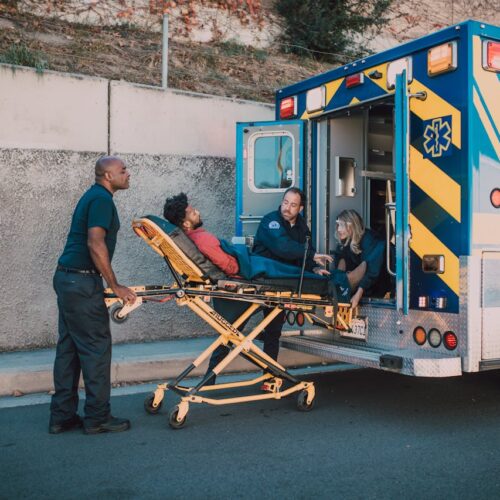For the Formerly Incarcerated, Peer Mentoring Can Offer Chance to ‘Give Back’
At Detroit Central City Community Mental Health in Wayne County, Michigan, clients used to arrive to see their clinicians or a doctor. Now, more frequently, they come to see their mentor.
The use of specially trained peer mentors—supportive mentors who have similar life experiences to their mentees—is increasingly popular among reentry service providers nationally. In the case of reentry, peer mentors have been previously incarcerated and have successfully rejoined the community, attaining housing, employment, and other hallmarks of stability.
With special certification, peer mentors can help with a mentee’s clinical recovery process in addition to offering specialized advice and support based on their own experiences navigating the complex systems of reentry services.
Peers an “Integral Part” of Second Chance Act Grantee’s Clinical Team
In Wayne County, Detroit Central City uses peer supports in their work with low-income individuals who have serious mental and behavioral health needs. The organization has provided community-based outpatient mental health services for more than 50 years, and also provides comprehensive wraparound services such as food, clothing, shelter, employment, and more to help promote wellness and stability within the Detroit-Wayne County communities. Their reentry services exclusively target individuals who have been diagnosed with a Severe and Persistent Mental Illness (SPMI).
As a FY2014 Second Chance Act Mentoring grantee, the organization credits its first peer-support project to statewide interest in using peer supports as a component of substance use treatment and mental health care. The initial 2009 program, a small pilot focused on individuals who were granted early release from prison, featured both group and one-on-one peer interactions.
As interest in peer programming continued to grow across the state, certified peer support specialists became a Medicaid reimbursable expense in Michigan. This means that Medicaid would cover the services of a certified peer support specialist who operated as part of a clinical team for an eligible individual.
“Utilizing peer supports was a good clinical move, but also cost-effective,” said Norris Howard, division manager of Community Reentry at Detroit Central City.
Today, the organization’s peer support specialists are an integral part of many clients’ clinical teams. Peers, who attend all clinical team meetings, often function as an important liaison between the person receiving care and the clinicians; someone in recovery, for example, may feel more comfortable confessing a relapse, a family conflict, or a health concern to a peer rather than to their case manager, social worker, or probation officer. In this way mentors can help clients be more “engaged in their treatment,” said Larry Cameron, a licensed master social worker and clinical coordinator for Community Reentry.
Having gone through the criminal justice system provides peer support specialists with some legitimacy, too.
“They’re not talking about something they’ve read,” Howard said. “They’re talking about something they know.”
A Model and a Future
Through billing Medicaid, Detroit Central City will be able to sustain its peer mentoring program and offer full-time employment to its mentors who achieve state certification.
Chris, a peer mentor, also described the program’s less tangible benefits.
“It gives me a chance to give back and feel like what I went through wasn’t totally in vain,” he said.
When first implementing peer supports, Detroit Central City initially had difficulty finding qualified peer support specialists locally. Then Michigan created its own statewide peer support certification program, and Detroit Central City was able to use its SCA Mentoring grant funding to carefully select eligible applicants they wanted in the role, allowing them to “select, train, and prepare [their] own pool of individuals.”
The organization now provides its peer mentors with the state’s curriculum for peer support specialists, and helps them apply and prepare for the Michigan certification test. While in training, mentors receive a stipend.
The program has helped some of Detroit’s most vulnerable citizens—individuals who have severe and persistent mental illness as well as criminal records—with the necessary supports for success in reentry. But it has also given peer support specialists an opportunity to be a model, showing, Howard said, that there is a place—and a future—in the professional world for individuals returning from prison and jail. Chris, for one, wants to continue his education and become a social worker.
“It gives our clients hope that there is a way to care for themselves and give back to others as well,” Cameron said.
______________________________________________
For more information on peer support specialists, see the National Alliance on Mental Illness and the Substance Abuse and Mental Health Services Administration. For information on certification, see the Peer Recovery Support Specialist Credential, or NCPRSS, from the National Association for Addiction Professionals.
In response to growing calls for police reform in New Jersey, particularly following the shootings of Najee Seabrooks…
Read More Three Things to Know About New Jersey’s Groundbreaking Community Response Legislation
Three Things to Know About New Jersey’s Groundbreaking Community Response Legislation
In response to growing calls for police reform in New Jersey, particularly…
Read More Apply Now: Join a Learning Community for Community and Crisis Response Teams to Improve Responses to Youth
Read More
Apply Now: Join a Learning Community for Community and Crisis Response Teams to Improve Responses to Youth
Read More
 Apply Now: Join a Learning Community Focused on Substance Use and Overdose Community Response Programs
Read More
Apply Now: Join a Learning Community Focused on Substance Use and Overdose Community Response Programs
Read More













